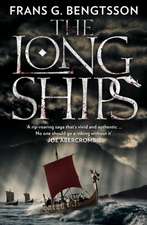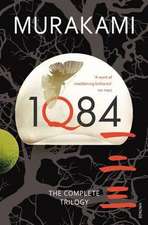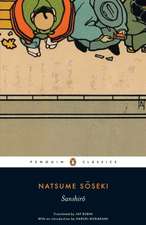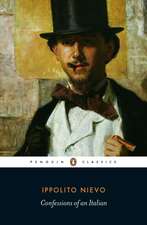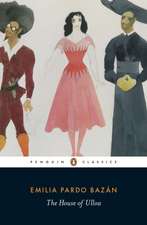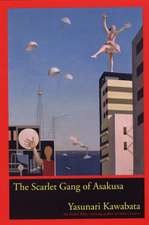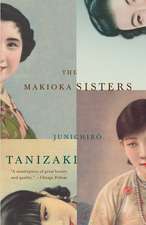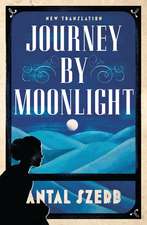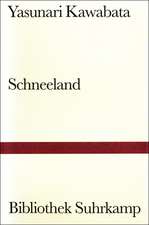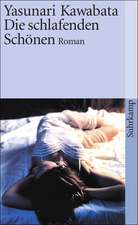Snow Country: Penguin Modern Classics
Autor Yasunari Kawabata Traducere de Edward G. Seidenstickeren Limba Engleză Paperback – 5 ian 2011
Yasunari Kawabata was born near Osaka in 1899 and was orphaned at the age of two. His first stories were published while he was still in high school and he decided to become a writer. He graduated from Tokyo Imperial University in 1924 and a year later made his first impact on Japanese letters with Izu Dancer. He soon became a leading figure the lyrical school that offered the chief challenge to the proletarian literature of the late 1920s. His writings combine the two forms of the novel and the haiku poems, which within restrictions of a rigid metre achieves a startling beauty by its juxtaposition of opposite and incongruous terms. Snow Country (1956) and Thousand Cranes (1959) brought him international recognition. Kawabata died by his own hand, on April 16 1972.
Snow Country is translated from the Japanese by Edward G. Seidensticker (1921-2007), who was a prominent scholar of Japanese literature.
| Toate formatele și edițiile | Preț | Express |
|---|---|---|
| Paperback (2) | 50.91 lei 24-30 zile | +15.34 lei 4-10 zile |
| Penguin Books – 5 ian 2011 | 50.91 lei 24-30 zile | +15.34 lei 4-10 zile |
| Vintage Publishing – 31 dec 1995 | 87.86 lei 3-5 săpt. | |
| Hardback (1) | 52.73 lei 24-30 zile | +18.37 lei 4-10 zile |
| Penguin Books – 3 noi 2022 | 52.73 lei 24-30 zile | +18.37 lei 4-10 zile |
Din seria Penguin Modern Classics
- 17%
 Preț: 41.41 lei
Preț: 41.41 lei -
 Preț: 82.90 lei
Preț: 82.90 lei -
 Preț: 81.99 lei
Preț: 81.99 lei - 15%
 Preț: 48.87 lei
Preț: 48.87 lei - 17%
 Preț: 52.07 lei
Preț: 52.07 lei - 19%
 Preț: 59.39 lei
Preț: 59.39 lei - 18%
 Preț: 46.05 lei
Preț: 46.05 lei - 17%
 Preț: 52.49 lei
Preț: 52.49 lei -
 Preț: 69.06 lei
Preț: 69.06 lei - 16%
 Preț: 58.66 lei
Preț: 58.66 lei - 17%
 Preț: 51.67 lei
Preț: 51.67 lei -
 Preț: 81.84 lei
Preț: 81.84 lei - 18%
 Preț: 46.25 lei
Preț: 46.25 lei -
 Preț: 97.20 lei
Preț: 97.20 lei - 17%
 Preț: 52.33 lei
Preț: 52.33 lei - 15%
 Preț: 48.90 lei
Preț: 48.90 lei - 16%
 Preț: 53.55 lei
Preț: 53.55 lei - 18%
 Preț: 51.39 lei
Preț: 51.39 lei -
 Preț: 63.28 lei
Preț: 63.28 lei - 16%
 Preț: 53.93 lei
Preț: 53.93 lei - 18%
 Preț: 51.00 lei
Preț: 51.00 lei - 15%
 Preț: 49.40 lei
Preț: 49.40 lei - 18%
 Preț: 50.73 lei
Preț: 50.73 lei - 16%
 Preț: 48.30 lei
Preț: 48.30 lei - 17%
 Preț: 52.10 lei
Preț: 52.10 lei -
 Preț: 81.61 lei
Preț: 81.61 lei - 17%
 Preț: 68.49 lei
Preț: 68.49 lei - 18%
 Preț: 46.25 lei
Preț: 46.25 lei - 18%
 Preț: 46.02 lei
Preț: 46.02 lei - 16%
 Preț: 42.26 lei
Preț: 42.26 lei - 17%
 Preț: 51.66 lei
Preț: 51.66 lei - 16%
 Preț: 48.45 lei
Preț: 48.45 lei - 17%
 Preț: 42.01 lei
Preț: 42.01 lei - 15%
 Preț: 54.63 lei
Preț: 54.63 lei - 18%
 Preț: 46.31 lei
Preț: 46.31 lei - 18%
 Preț: 46.31 lei
Preț: 46.31 lei - 16%
 Preț: 53.59 lei
Preț: 53.59 lei - 16%
 Preț: 53.11 lei
Preț: 53.11 lei -
 Preț: 95.04 lei
Preț: 95.04 lei - 16%
 Preț: 79.93 lei
Preț: 79.93 lei - 18%
 Preț: 46.02 lei
Preț: 46.02 lei - 15%
 Preț: 55.26 lei
Preț: 55.26 lei - 17%
 Preț: 51.60 lei
Preț: 51.60 lei - 16%
 Preț: 53.36 lei
Preț: 53.36 lei - 16%
 Preț: 53.36 lei
Preț: 53.36 lei - 18%
 Preț: 51.38 lei
Preț: 51.38 lei - 16%
 Preț: 68.94 lei
Preț: 68.94 lei - 16%
 Preț: 48.46 lei
Preț: 48.46 lei - 16%
 Preț: 53.37 lei
Preț: 53.37 lei - 17%
 Preț: 52.33 lei
Preț: 52.33 lei
Preț: 50.91 lei
Preț vechi: 62.15 lei
-18% Nou
9.74€ • 10.59$ • 8.19£
Carte disponibilă
Livrare economică 03-09 aprilie
Livrare express 14-20 martie pentru 25.33 lei
Specificații
ISBN-10: 0141192593
Pagini: 128
Dimensiuni: 129 x 198 x 7 mm
Greutate: 0.1 kg
Editura: Penguin Books
Colecția Penguin Classics
Seria Penguin Modern Classics
Locul publicării:London, United Kingdom
Notă biografică
Snow Countryis translated from the Japanese by Edward G. Seidensticker (1921-2007), who was a prominent scholar of Japanese literature.
Descriere
Recenzii
—The Time Literary Supplement (London)
“Kawabata’s novels are among the most affecting and original works of our time.”
—The New York Times Book Review

